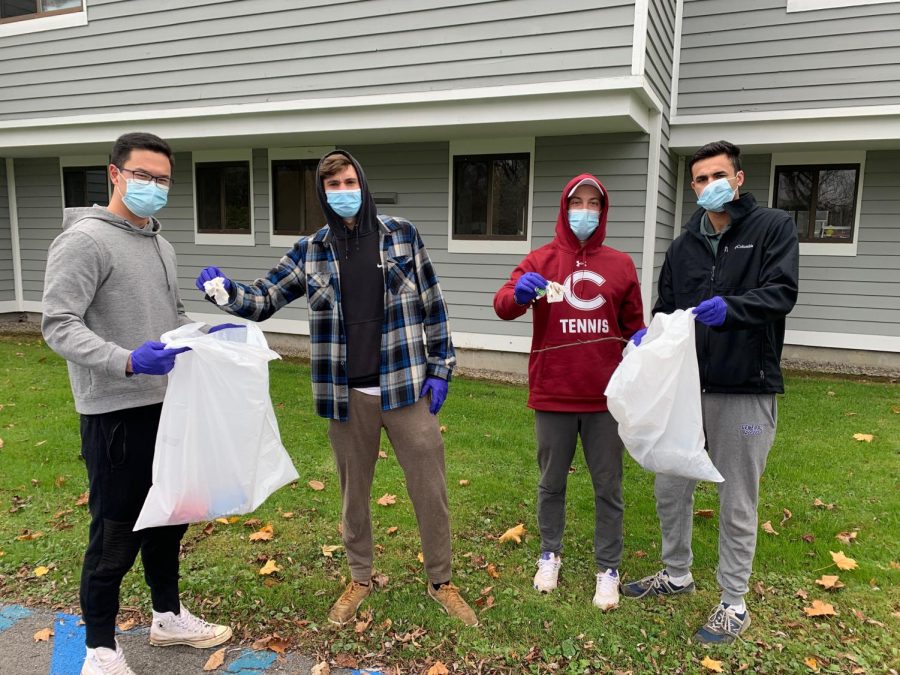Students Take Part In Campus-Wide Cleanup
Increased use of COVID-19-friendly plastic packaging and utensils in conjunction with Halloween made last weekend ideal for a campus-wide cleanup, according to junior Emma Schaeffer, a member of Fraternity and Sorority Sustainability Council (FSA Sustainability Council).
The cleanup, held on Sunday, Nov. 1, targeted six zones on Upper Campus in addition to the areas surrounding Taylor Lake and the Parker apartments, the rugby field and the Hamilton Village Green. The event was co-sponsored by Colgate’s Office of Sustainability, FSA Sustainability Council and Mabel Dart Colegrove Commons (MDCC).
According to senior Ethan Reiser, an intern at the Office of Sustainability and sustainability chair for Theta Chi, additional COVID-19 safety precautions were necessary in facilitating Sunday’s cleanup.
“[We] adequately prepared the proper safety measures and [provided] participants with hand sanitizer and gloves, as well as ensured that all participants understand that masks and social distancing is required at all times,” Reiser said.
Created last year, FSA Sustainability Council is focused on increasing sustainability efforts in Greek housing and around campus. Sunday’s cleanup was the first event that the FSA Sustainability Council has co-sponsored, but Schaeffer hopes it will become an annual event.
“We think that this could be a really good way to get students involved in sustainability in a really easy way, not only this year but hopefully in the future as well,” Schaeffer said.
Reiser echoed Schaeffer’s view, emphasizing how the event’s accessibility could create a lasting impact on students’ relationships with sustainability.
“Cleaning up campus really acts as a bit of a sustainable metaphor, in that it not only physically cleans up that campus but allows students to reflect on how their actions have a bigger impact than they might think,” Reiser said. “I hope that seeing the amount of waste on campus, as well as how much better it will be after the event, will show students that even something as small as cleaning up litter, turning off lights, or other easy sustainable actions can really have a large impact when compounded with others.”
According to Reiser, the power of compounding effects was mirrored in the collaboration of students across campus for the purpose of sustainability.
“We are hoping that [the event] will rally students together around sustainability. Especially in this semester, where COVID-19 has taken away a lot of our opportunities to be social, we hope that this event will allow students an outlet through which they can come together around a shared sustainable goal… something that is really rare and much needed,” Reiser said.
Reiser said he believes that, in addition to fostering connections among Colgate students, the cleanup provided an opportunity for students to get involved with the Hamilton community.
“I hope that they see it as a concerted effort by the student body to become more involved with the entirety of the community in a positive way,” Reiser said. “I think that, especially this semester, the relationship between the students and community members is strained, and I hope that community members can see this as students reaching out into the community with positive efforts.”
Although the event was open to all Colgate students and co-sponsored by the MDCC and Office of Sustainability, the majority of cleanup participants were affiliated with fraternities and sororities. In considering increasing participation among students from non-Greek spaces for other cleanups, Schaeffer is hopeful that the FSA Sustainability Council will broaden in the future.
“The Fraternity Sorority Sustainability Council hopes to evolve to a broader student sustainability council, encompassing athletics, clubs and a variety of organizations across campus,” Schaeffer said. “We really hope that we would be able to create a culture of sustainability across campus and really weave sustainability into the operations and priorities of all organizations on campus.“
Schaeffer and Reiser are optimistic about future cleanups, and positive experiences from participants could be indicative of a strong student turnout in the future.
“It was really nice to see people across campus come together for environmental stewardship and have a fun time doing it,” senior Tommy Colman said.











